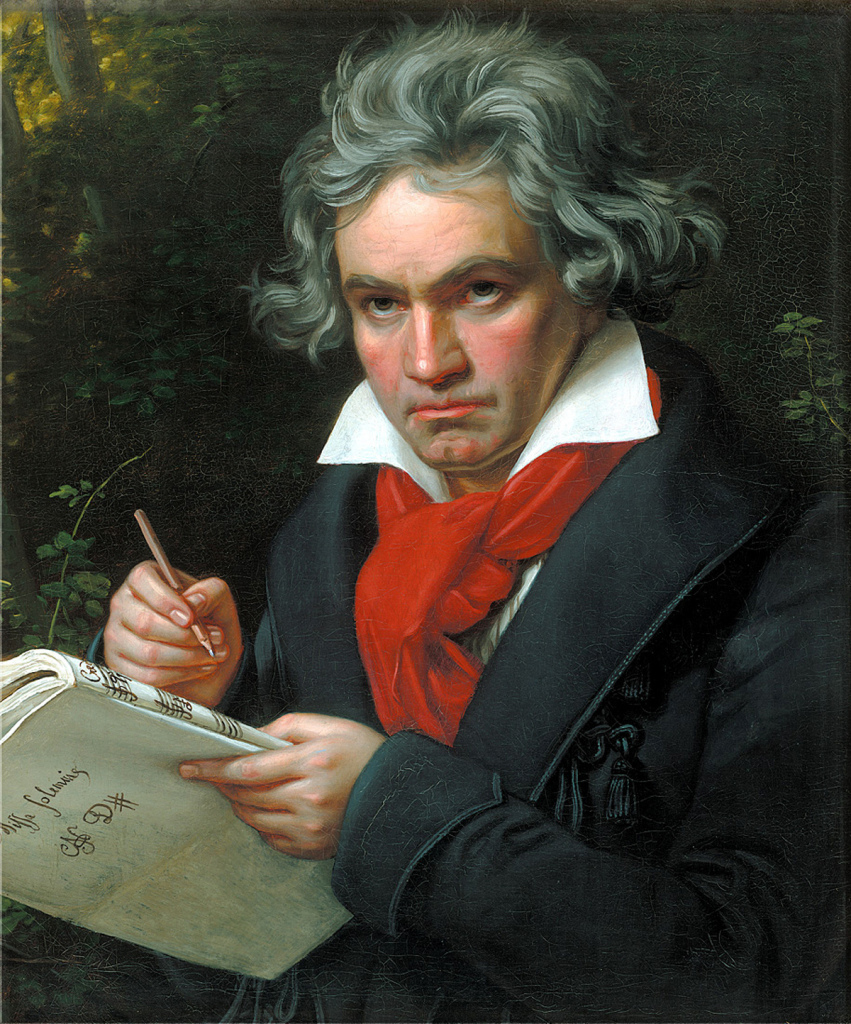
Ludwig van Beethoven (1779-1827)
On December 17, 1770, German composer and pianist Ludwig van Beethoven was born. He is considered a crucial figure in the transition between the Classical and Romantic eras in Western art music, and remains one of the most famous and influential of all composers.
“Music is a higher revelation than all wisdom and philosophy.”
– Ludwig van Beethoven, as reported by Bettina von Arnim in a letter to Goethe, 28 May 1810.
Ludwig van Beethoven – Early Years
Born as the eldest of three children in Bonn, then the capital of the Electorate of Cologne and part of the Holy Roman Empire, Beethoven displayed his musical talents at an early age and was taught by his father Johann van Beethoven and by Christian Gottlob Neefe. Without a doubt, the child was gifted and his father Johann envisioned creating a new Mozart, a child prodigy, when he started to give the first piano lessons at the age of 4. On March 26th 1778, at the age of 7, Ludwig Van Beethoven gave his first public performance at Cologne. His father announced that he was 6 years-old. Because of this Beethoven always thought that he was younger than he actually was. [1]
His Talents Get Noticed
Some time after 1779, Beethoven began his studies with his most important teacher in Bonn, Christian Gottlob Neefe, who taught Beethoven composition. Beethoven soon began working with Neefe as assistant organist of the court chapel conducted by the Kapellmeister Andrea Luchesi. His first three piano sonatas, named “Kurfürst” (“Elector“) for their dedication to the Elector Maximilian Frederick, were published in 1783. Maximilian Frederick noticed Beethoven’s talent early, and subsidized and encouraged the young man’s musical studies.
Mozart and Haydn
In 1787 Beethoven traveled to Vienna, Austria, apparently to seek out Wolfgang Amadeus Mozart as a teacher.[7] He was forced to return to Bonn to care for his ailing mother, who died several months later. His father died in 1792, and Beethoven went back to Vienna to study with the famous composer Joseph Haydn. Beethoven was not totally satisfied with Haydn’s teaching, though, and he turned to musicians of lesser talent for extra instruction.[2] He then studied with Johann Georg Albrechtsberger, the best known teacher of counterpoint in Vienna. By 1793, Beethoven established a reputation as an improviser in the salons of the nobility, often playing the preludes and fugues of J. S. Bach’s Well-Tempered Clavier.
The Moonlight Sonata
“Go on, practice not only art, but also penetrate into its inner being; it deserves it. For only art and science raise man up to the Deity. […] The true artist has no pride; unfortunately he sees that art has no borders, he feels dark, how far he is from the goal, and if he is perhaps admired by others, he mourns that he has not yet reached where the better genius shines for him only like a distant sun”.
– Ludwig van Beethoven, Letter to Emilie M. zu H., July 17, 1812.
Once establishing himself, he began composing more. In 1800, he performed his first symphony and a septet (op. 20). Publishers soon began to compete for his newest works. [3] Mozart and Haydn were undeniable influences. But Beethoven’s melodies, musical development, use of modulation and texture, and characterization of emotion all set him apart from his influences, and heightened the impact some of his early works made when they were first published. Beethoven’s compositions between 1800 and 1802 were dominated by two large-scale orchestral works, although he continued to produce other important works such as the piano sonata Sonata quasi una fantasia known as the “Moonlight Sonata“.
Growing Deafness
Around 1796, by the age of 26, Beethoven began to lose his hearing. He suffered from a severe form of tinnitus, a “ringing” in his ears that made it hard for him to hear music; he also tried to avoid conversations. Beethoven, on the advice of his doctor, lived in the small Austrian town of Heiligenstadt, just outside Vienna, from April to October 1802 in an attempt to come to terms with his condition. There he wrote his Heiligenstadt Testament, a letter to his brothers which records his thoughts of suicide due to his growing deafness and records his resolution to continue living for and through his art. Beethoven’s hearing loss did not prevent him from composing music, but it made playing at concerts — a lucrative source of income — increasingly difficult.
The Heroic Period
Beethoven’s return to Vienna from Heiligenstadt was marked by a change in musical style, and is now designated as the start of his “Middle” or “Heroic” period. The first major work employing this new style was the Third Symphony in E flat, known as the “Eroica“. This work was longer and larger in scope than any previous symphony. When it premiered in early 1805 it received a mixed reception. Some listeners objected to its length or misunderstood its structure, while others viewed it as a masterpiece. The middle period work includes among others the Third through Eighth Symphonies, the “Waldstein” and “Appassionata” piano sonatas, as well as the opera Fidelio. During May 1809, when the attacking forces of Napoleon bombarded Vienna, according to Ferdinand Ries, Beethoven, very worried that the noise would destroy what remained of his hearing, hid in the basement of his brother’s house, covering his ears with pillows.
Napoleon Defeated
After Napoleon’s defeat, he was also one of many composers who produced music in a patriotic vein to entertain the many heads of state and diplomats who came to the Congress of Vienna in 1814.[6] After serious health problems – he called it himself ‘inflammatory fever’ – that led to a drop of his musical output, by early 1818 Beethoven’s health had improved. From about 1813 onwards Beethoven used ear trumpets to communicate with his surroundings, and from 1818 onwards the use of so-called conversation books, in which the interlocutors noted down their utterances, must be proved. Due to his advanced hearing loss, it was no longer possible for him to perform as a pianist. Beethoven’s deafness and his temper contributed to his reputation as an unpleasant personality.
Deafness
Somehow, despite his tumultuous personal life, physical infirmity and complete deafness, Beethoven composed his greatest music near the end of his life. His greatest late works include Missa Solemnis, a mass that debuted in 1824, as well as his Beethoven’s Ninth and final symphony, which should remain his most towering achievement. The symphony’s famous choral finale with the words of Friedrich Schiller‘s poem “Ode to Joy,” is perhaps the most famous piece of music in history.[5] The premiere of the 9th Symphony op. 125 on 7 May 1824 was enthusiastically received by the audience. The performance was conducted by Kapellmeister Michael Umlauf, with Beethoven on the conductor’s podium. At the same time as the Mass, Beethoven was working on the 33 changes on a waltz by Anton Diabelli op. 120, a cycle of variations for piano, which was the result of a call by music publisher and composer Diabelli. Diabelli had sent his waltz to numerous composers with the request to contribute one variation each to a planned collective edition. While working on the Missa solemnis and the Diabelli Variations, Beethoven continued the series of his last piano sonatas with op. 109, 110 and 111.
Final Years
Finally, between spring 1824 and autumn 1826, beginning with the String Quartet op. 127, a final group of five string quartets was composed. The quartet production was initiated by a composition commission from the Russian music lover Nikolai Borisowitsch Prince Galitzin. Beethoven received additional motivation from the return to Vienna of the violinist Ignaz Schuppanzigh, who had been travelling since 1816 and whose ensemble had premiered almost all of his earlier string quartets. The String Quartet in F Major op. 135 was the last work Beethoven completed, which is still difficult even for today’s audience, who knows how to interpret his other works. In 1826, Beethoven caught a cold coming back from his brother’s place, with whom he had argued again. The illness complicated other health problems that Beethoven had suffered from all his life.[1] Beethoven died on 26 March 1827 at the age of 56 during a thunderstorm.
“Too bad, too bad, too late!”
– Ludwig van Beethoven, Last words, he can no longer enjoy the last delivery of wine, 26 March 1827
Music Historian Robert Greenberg presents a lecture on the life of Beethoven, [10]
References and Further Reading:
- [1] Ludwig van Beethoven Biography at lvbeethoven.com
- [2] Ludwig van Beethoven at Notable Biographies.com
- [3] Ludwig van Beethoven at About.com
- [4] Beethoven Biography Pages at raptusassociation.org
- [5] Art is the Daughter of Freedom – Friedrich Schiller, SciHi Blog
- [6] The Congress of Vienna 1814 – Redrawing the Map of Europe, SciHi Blog
- [7] Mozart’s Famous Masonic Opera – The Magic Flute, SciHi Blog
- [8] Works by or about Ludwig van Beethoven at Wikisource
- [9] Ludwig van Beethoven at Wikidata
- [10] Music Historian Robert Greenberg presents a lecture on the life of Beethoven, San Francisco Performances @ youtube
- [11] Cassedy, Steven (January 2010). “Beethoven the Romantic: How E. T. A. Hoffmann Got It Right”. Journal of the History of Ideas. 71 (1): 1–34.
- [12] Timeline of Ludwig van Beethoven, via Wikidata

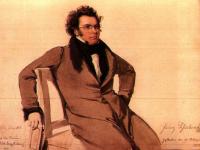
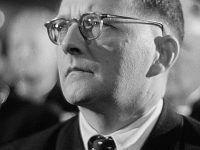
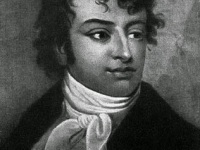
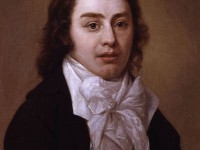

Pingback: Probably the best known composer of the world - Ludwig van Beethoven - Kala Su Abhivyakti